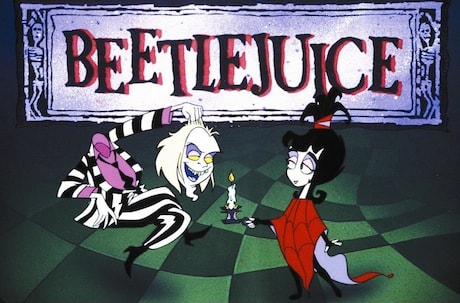Tim Burton's 1988 ghost comedy, Beetlejuice, raked in over $70 million at the box office, so it came as no surprise that the following year, Tim Burton signed-on as executive producer for the cartoon adaptation. The idea was simple: capitalize (read: milk the cow dry) on the popularity of the film, playing-up some of the kookier themes and gimmicks (the "Neitherworld") for a watered-down children's version. For 1989, the self-proclaimed "ghost with the most" had little competition in the animated world and children flocked to the program for its strange and unusual, darker, less sanitized content. Predominantly sight-gag-driven, Beetlejuice was a versatile cartoon that successfully bridged the gap between subversive and child-friendly, infusing gothic examinations of the undead with slaphappy quirkiness. And while the show was loosely based upon the film, it focused mostly on a relationship not present (at least not in an affable sense) in the movie between goth girl Lydia Deetz and the titular Beetlejuice. Each episode followed the two on an adventure of sorts, which more often than not found them in the "Neitherworld," encountering a wide range of undead characters, learning valuable lessons about responsibility and earning trust. Over the span of four seasons and 94 episodes, Beetlejuice got into all sorts of mischief, ranging from seeming banalities like babysitting an undead infant all the way up to parodying The Wizard of Oz. While his character had been watered-down from the original work, he still wasn't portrayed as a good guy. He was prone to lying, stealing and cheating, which always forced Lydia to help and in turn taught him to learn the errs of his ways, inevitably concluding with the raunchy ghoul projecting his life lesson onto a presumably irreverent youth audience. As is the case with going back and re-watching most cartoon series' from the '80s and early '90s, it doesn't quite capture the same sense of whimsy. Some of the jokes in Beetlejuice feel weighty and obvious, even for the target demographic, but, for the most part, the cartoon series manages to hold up against the test of time, thanks in large part to the highly accessible episodic life lessons that children (and some adults) still have yet to learn. The biggest disappointment with this box set is its complete lack of special features. One has to wonder: what was it like to voice the characters on the cartoon or what was Tim Burton's level of involvement in the series?
(Shout! Factory)Beetlejuice: The Complete Series

BY Daniel PrattPublished Jun 25, 2013



